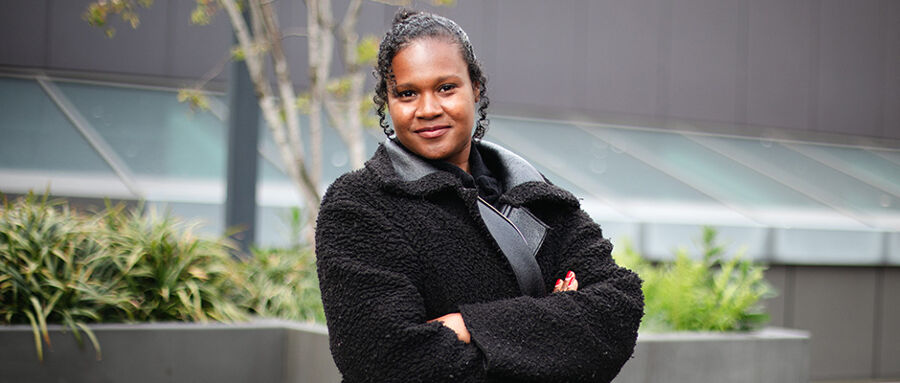
Lerelle Willden-Lewis
Media PhD
After facing personal challenges that interrupted her first attempt at another university, Lerelle decided to study at BCU and graduated with a first-class undergraduate degree followed by a Master’s with distinction. Encouraged by her dissertation supervisor and driven by a passion for research, she began a PhD exploring marginalised queer people’s use of dating apps, while also becoming a foster parent. Her journey reflects resilience, academic excellence, and a commitment to making digital spaces safer and more inclusive for under-represented communities.
“My journey into higher education was not straightforward. I initially faced many personal challenges that prevented me from completing my undergraduate degree at another university. Life took a different path, and I began working full-time to pay rent, but the desire to achieve more never left me. As I started building a life with my wife and our growing family, that ambition only grew stronger.
During the pandemic, I made a bold decision: I left my job and returned to university to complete my bachelor’s degree at Birmingham City University. I was pregnant through most of the course, and despite that, I achieved a first-class degree - thanks to the incredible support I received from BCU.
Following this success, I decided to study my Master’s online at BCU whilst on maternity leave. It took resilience, but I was determined to complete it. With help from my wife and family and the support offered by BCU, I was able to achieve a distinction. This is my proudest moment of being a BCU student so far!
I fell in love with studying, reading and analysing. After discussions with my dissertation supervisor, she encouraged me to push myself to do a PhD. I didn’t realise that this was an option for me, especially as a mother. I couldn’t move into student dorms and shut out the world – I had the nursery and school run to do!
I decided to apply to a PhD studentship funded by the university, and I was thrilled to be accepted. I also started fostering when I started the PhD, so I’m glad I can share my journey with two children and make this path a visible possibility for them, if they want it. I wanted to challenge myself academically and make a true difference.
My thesis title is Marginalised Queer People’s Use of Dating Apps. Black and queer voices are often under-represented in academia, and there are a lot of gaps I’d love to fill. I am very passionate about the queer community and was interested in our use of digital spaces. This topic felt very relevant to everyday life, and had ties to my Master’s dissertation so it felt familiar.
At BCU, I work mostly on campus in our Millenium Point building, in an office space with other passionate postgraduate researchers. I love being a part of the researcher community here, and I love the study spaces available to me, such as the library and research hub, which is dedicated space for researchers. I was made to feel welcome when I joined BCU by lots of inductions, tours, social events and free pizza!
BCU has provided me with lots of different types of support during my PhD journey so far. This includes my amazing supervisors, insightful workshops and great spaces to work. I’d say that the most challenging aspect of my PhD is balancing everything including my studies, work, children, marriage and self-care. I’m working on campus more often, as I find it helps to make things a bit more separate from home life and more manageable.
To anyone who is considering studying a postgraduate degree at BCU, I say go for it! Bring your perspective to a very relevant and changing field. You can make a real difference.
In terms of the future, I want my research to increase safety and inclusivity in digital spaces. As online spaces take over more and more aspects of our lives, I’d like my research to play a part in making them safer for everyone, particularly marginalised groups.
To me, “IAMBCU” represents the people behind the studies. For me personally, if you can’t see it, you can’t be it, so it means a lot to represent other female black academics."